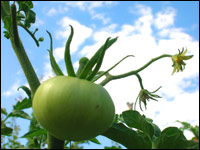Articles by Tom Philpott
Tom Philpott was previously Grist's food writer. He now writes for Mother Jones.
All Articles
-
Two new photo books focus on food
In the valuable new book Fields of Plenty: A Farmer’s Journey in Search of Real Food and the People Who Grow It, author Michael Ableman rambles across the country in a VW van, visiting small-scale farmers to talk with them at the table and in the field. Vine and dandy. Photo: Chrissi Nerantzi. Not surprisingly, […]
-
WSJ says cutting subsidies would make ethanol more viable. Oh really?
The Wall Street Journal ran an article yesterday on "How Brazil Broke Its Oil Habit."
The article attempts to draw lessons for the U.S. from the Brazilian experience, where sugarcane-based ethanol supplies 18 percent of the transportation market. The author, David Luhnow, seeks to apply "lessons from the sugar fields of Brazil to U.S. cornfields."
The first problem I see here -- and more scientifically sophisticated Gristmillers like biodiversivist and greenstork are invited to weigh in here -- is that sugarcane seems a much more efficient way to create ethanol than corn. Ethanol is just alcohol, right? The process of making it means converting sucrose to alcohol. And sugarcane has a lot more sucrose, on a per-weight basis, than corn. Right? Thus it would require more energy input to create a given amount of ethanol from corn than it would from sugarcane. Someone please correct me if I'm wrong.
Secondly, Luhnow states that ethanol didn't really take off in Brazil until the government stopped subsidizing sugar farmers. This moves him to write:
-
ADM is doing for soil what Exxon has done to air
Amid all the hoopla over President Bush's State of the Union address, Archer Daniels Midland's quarterly report (PDF), released Tuesday, got little attention outside of Wall Street -- where it drew cheers, sending ADM's share price to an all-time high.
At the company's conference call with analysts, the Wall Street Journal reports, John M. McMillin of Prudential Securities "likened [Archer Daniels Midland] to Exxon Mobil Corp., which just announced its own record-breaking profit and jokingly suggested the company might be called upon to explain its profits."
Actually, McMillin's comparison isn't all that comical. Just as ExxonMobil clawed its way to the top of the corporate heap by peddling an environmentally ruinous commodity whose real costs don't burden its balance sheet, ADM's "blowout" profits can be traced directly to government largesse. Oh yeah, and both companies owe much of their surging profitability to making fuel for cars.
-
Why the global food system isn’t kind to local farmers
 Recently, I've come across two articles that pungently demonstrate the place of small-scale farmers in a global economy geared toward long-distance trade.
Recently, I've come across two articles that pungently demonstrate the place of small-scale farmers in a global economy geared toward long-distance trade. The first, a Salon-published excerpt from Charles Fishman's recent book The Wal-Mart Effect, explores what the U.S. love affair with $5/pound salmon means for Chile. (Prepare to click through a few ads to get to the story.) The other, a NY Times piece, depicts high-level hand-wringing in China over rural "land grabs by officials eager to cash in on China's booming economy."
(Thanks to Tyler Bell for alerting me to the Salon piece.)
